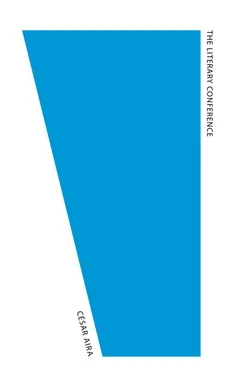Here I must attempt a first and partial translation. The “Mad Scientist” is, of course, me. The identification of the Genius may end up being more problematic, but it’s not worth wasting time with conjectures: it is Carlos Fuentes. If I agreed to go to that conference in Mérida it was only after I had confirmation that he would attend; I needed to get close enough so that my cloned wasp could take a cell from him. It was a unique opportunity to gain access to him for my scientific manipulations. They served him to me on a platter, and I didn’t even have to spend money on an airplane ticket, which I wouldn’t have been able to afford, given how bad things had been lately. Or how they had been before the Macuto Line episode. I had had a terrible year, without work, a result of the seriousness of the economic crisis, which especially affected publishing. In spite of this, I had not interrupted my experiments, because at the level on which I was working, I didn’t need money. In addition to suiting to a tee the pursuit of my secret goals, this invitation to the conference gave me the opportunity to spend a week in the tropics and take a vacation; rest, recuperate, and refresh myself after a year of constant worries.
Upon my return to the hotel, the excitement of the past few hours reached its anticlimax. The first part of the operation, the most demanding part for me, was over: I had obtained a cell from Carlos Fuentes, I had placed it inside the cloning machine, and I had left the machine to operate under optimum conditions. If you add to this the fact that the previous day I had solved the secular enigma of the Macuto Line, I could feel momentarily satisfied and think about other things. I had a few days to do just that. Cloning a living being is not like blowing glass. It happens on its own, but it takes time. Even though the process is prodigiously accelerated, it requires almost a week, according to the human calendar, for it must reconstruct on a small scale the entire geology of the evolution of life.
All I could do was wait. In the meantime, I had to figure out how to spend my time. As I had no intention of attending the tedious sessions of the conference, I bought a bathing suit and, beginning the following day, I spent mornings and afternoons at the swimming pool.
At the swimming pool, I focused all my efforts on one goal: to reduce my mental hyperactivity. To let myself be, naked under the sun. To create internal silence. I have pursued this goal through all of life’s twists and turns, almost like an idée fixe. This is the small and alarming idea that stands out in the midst of all other ideas and raises the volume of psychic noise, which is already quite considerable. Hyperactivity has become my brain’s normal way of being. It’s always been like that, to tell the truth, at least since my adolescence, and I’ve learned about the more normal way most other people are — hesitant and half-empty — through reading, observation, deduction, and conjecture. And because, on a few occasions, for a few seconds, I have had that experience. My readings in Eastern psychic techniques, and even those stupid articles about “meditation” that often appear in women’s magazines, have taught me that there is one further step: an empty mind, the complete or almost complete lack of electrical activity in the cerebral cortex, a blackout, rest. And if at one time, with my characteristic ambitiousness, I, too, wished to achieve that, and practiced all the recommended exercises with innocent trust, I finally grew convinced that I was wasting my time. It wasn’t for me. First, I would have to descend from my peaks of frenzy, take hold of the reins, and mollify the runaway beast of my thoughts, force it to slow to a normal pace; only then would I have a chance to glimpse those Eastern worlds of spiritual serenity.
I have often asked myself how I got into this situation, what happened during my formative years that increased the speed of my mental flow so excessively and made it stick there. I have also asked myself (what haven’t I asked myself?) what the exact measure of that speed is, for the very concept of “mental hyperactivity” is approximate and must contain gradations.
To the first question, regarding the history of my malady, I have responded for better or for worse with a small and private “creation myth,” whose modulations have been all the novels I have written. I would be hard put to spell this out in the abstract because the myths’ variations are not specific “examples” of a general form, in the same way that specific thoughts that are always flashing through my head like lightning are not case studies or examples of a type of thought.
That myth of the ideal myriads, that little drama without characters or plot, would be shaped like a valve. Or, in less technical terms, it would have the characteristic Baudelaire called “irreversibility.” A formulated thought does not pass back through the same Caudine forks of its birth, does not return to the nothingness from which it came. Which explains not only the fierce overcrowding but also a quite visible feature of my personality: my bewilderment, my imprudence, my frivolity. The withdrawal of an idea to the conditions of its production is the necessary condition for its seriousness.
In my case, nothing returns, everything races forward, savagely being pushed from behind by what keeps coming through that accursed valve. This image, brought to its peak of maturation in my vertiginous reflections, revealed to me the path to the solution, which I forcefully put into practice whenever I have time and feel like it. The solution is none other than the greatly overused (by me) “escape forward.” Since turning back is off limits: Forward! To the bitter end! Running, flying, gliding, using up all the possibilities, the conquest of tranquility through the din of the battlefield. The vehicle is language. What else? Because the valve is language. Therein lay the root of the problem. Which doesn’t mean that once in a while, such as during those sessions at the pool, I didn’t attempt a more conventional method, by relaxing, by trying to forget everything, by taking a short vacation.
But I have no illusions: there’s something phony about this effort because I don’t believe I’ll ever renounce my old and beloved cerebral hyperactivity, which, in the end, is what I am. Despite all our plans to change, we never voluntarily do so at the core, in our essence, which is usually where we find the knot of our worst defects. I could change it — and I surely would have already — if it were a visible defect, like a limp or acne; but it isn’t. The rest of the world has no inkling of the mental whirlwinds swirling under my impassive facade, except, perhaps, through the amplification of that impassivity, or through certain digressions I engage in and abandon without warning. Or perhaps, for a superhuman literary critic, through my relationship with language. My cerebral hyperactivity makes itself manifest inside me (and language is my bridge to the exterior) with rhetorical or quasi-rhetorical mechanisms. These then get distorted in a very peculiar fashion. Take metaphor, for example: everything is a metaphor in the hyperkinetic microscope of my psyche, everything is instead of something else. . But you cannot extract yourself unscathed from the whole: the whole creates a system of pressures that distorts the metaphors, moving their parts around between metaphors, thereby establishing a continuum.
“Rising above” this situation requires an enormous effort of art-science in the face of which I have not, of course, recoiled. But I engage in this effort on my own terms. Heisenberg’s principle also comes into play here: observation modifies the object of observation and increases its velocity. Under my interior magnifying glass, or inside it, each thought takes on the figure of a clone in its rhetorical anamorphosis: an overdetermined identity.
Читать дальше












